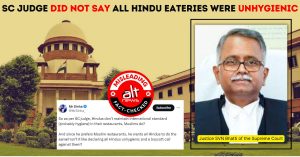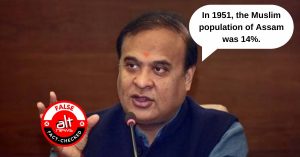On October 30, 2022, The Wire registered a police complaint against journalist Devesh Kumar for allegedly fabricating and supplying documents, emails, and video with a view to damage the media outlet’s reputation, a week after having retracted its Meta stories. It was the culmination of a high-octane, month-long drama over a series of articles by The Wire wherein they primarily claimed that the BJP information technology department chief Amit Malviya had privileges through a programme called XCheck which allowed him to get any post removed from Instagram with ‘no questions asked’, even if it did not violate Meta’s policies. Meta denied the allegations.
It was a rare, if not unprecedented, development. One might remember the much talked-about case of fraud involving Stephen Glass, the associate editor at The New Republic, but such a thing as a media house filing a police complaint against one of its own over a story was unheard of. And from what information was available in the public domain — this interview of The Wire’s founding editor Siddharth Varadarajan in particular — it appeared that tech journalist-cum-researcher Devesh Kumar had single-handedly pulled a fast one on an editorial team headed by some of India’s most highly regarded journalists.
When Alt News decided to profile Devesh Kumar, we faced one dead end after another. We started by looking into his social media posts, engagements and blogs, almost all of which have now been deleted. But eventually, we could find out that prior to The Wire, Devesh was professionally attached to the Mahatma Gandhi Institute of Education for Peace and Sustainable Development (MGIEP), a UNESCO centre in New Delhi. We reached out to the MGIEP communications team and several of its employees, but none of them cooperated with us. However, four rather disgruntled ex-employees of UNESCO MGIEP agreed to speak to us about their former colleague, Devesh Kumar. They requested anonymity for fear of backlash from Devesh and his coterie, comprising the top brass at MGIEP.
AT MGIEP: A TECH WIZARD IN SLIPPERS
We interviewed the four former employees of MGIEP — let us call them Anon1, Anon2, Anon3 and Anon4 — separately and verified their claims independently through our research. We noticed that their narratives coincided with several claims Devesh himself had either made in his blogs or documented on social media platforms over the years.
Anon1 said they were first acquainted with Devesh at a conference on education for sustainable development in Japan in 2014, where he had been nominated by the MGIEP to represent their youth programmes. By that time, Devesh had established his credibility as a professional coder and UX designer through the Microsoft Imagine Cup in which he, along with his team, won the people’s choice award. The team was called The D Labs. This can be verified through the LinkedIn profile of one of the members as well as the Facebook Page of D Labs that made an appeal for vote. Microsoft’s press release from 2012 also confirms the same.

Recounting their encounter, Anon1 told Alt news that at the conference in Japan, Devesh came across as an unassuming tech wizard-cum-activist casually dressed and wearing slippers. At an international conference involving hundreds of thorough-bred professionals, Devesh made sure he stood out. He spoke for all the right causes, whether sustainability or education or mental health, and did not shy away from expressing his vulnerabilities, thus endearing him to the MGIEP brass.
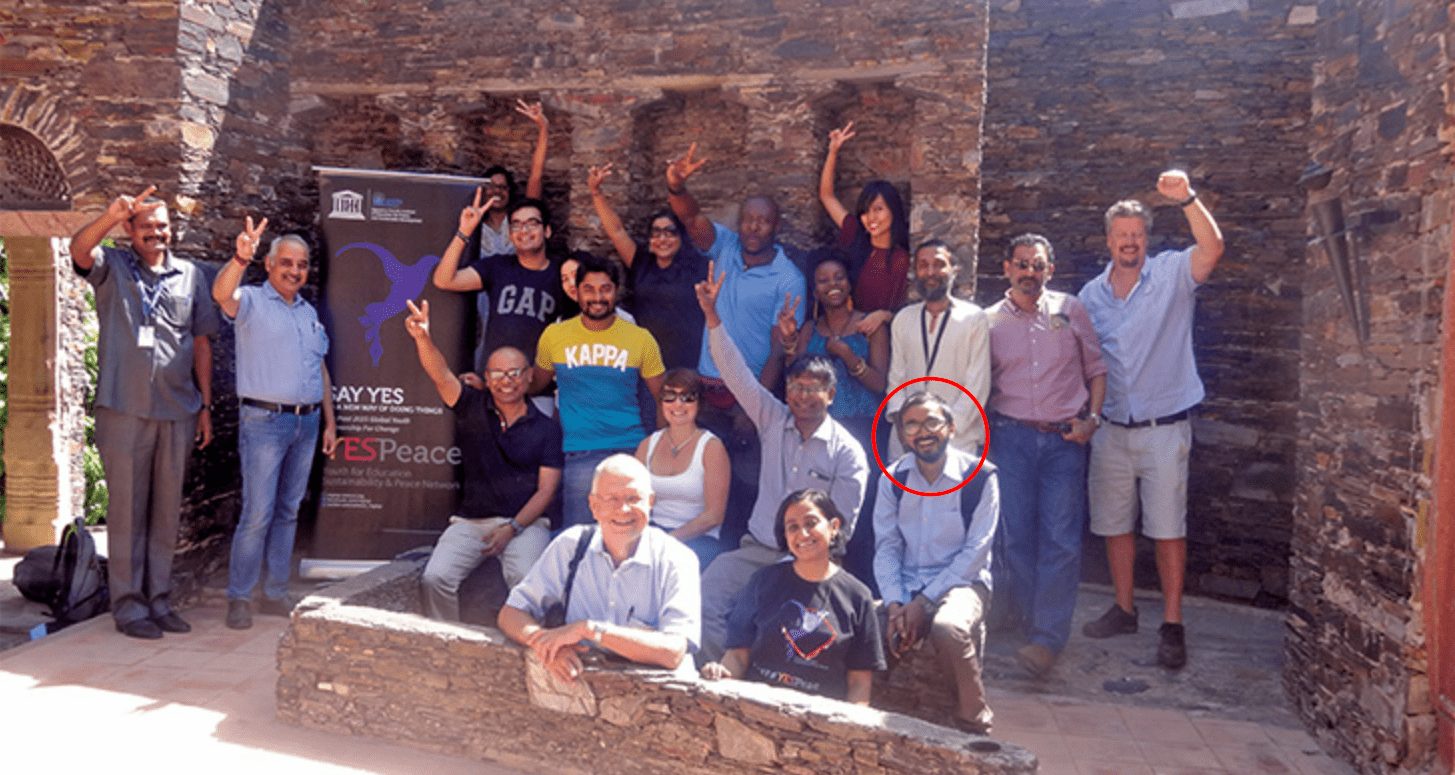
‘I DON’T THINK I HAVE MUCH TIME LEFT’: BRAIN TUMOUR & DEPRESSION
Two personal disclosures by Devesh had a strategic importance in creating his persona at the organization and beyond. At least some MGIEP employees were in the know of these. One was about his brain tumour and the other about his adopted daughter, Manjiri.
All of our four sources individually spoke about this episode in 2018 when Devesh wrote an e-mail (screenshot below) to the internal mailing list saying he had been suffering from a brain tumour, and apologized for not being able to meet certain deadlines. It started with the line, “I don’t think (and my doctor too) I have much time left.” He shared a prescription and a medical report from MD Anderson Cancer Centre, University of Texas. There were murmurs within the organization about the authenticity of these papers. Anon1 said that later the same year, he stopped talking about it as if it had miraculously healed itself.
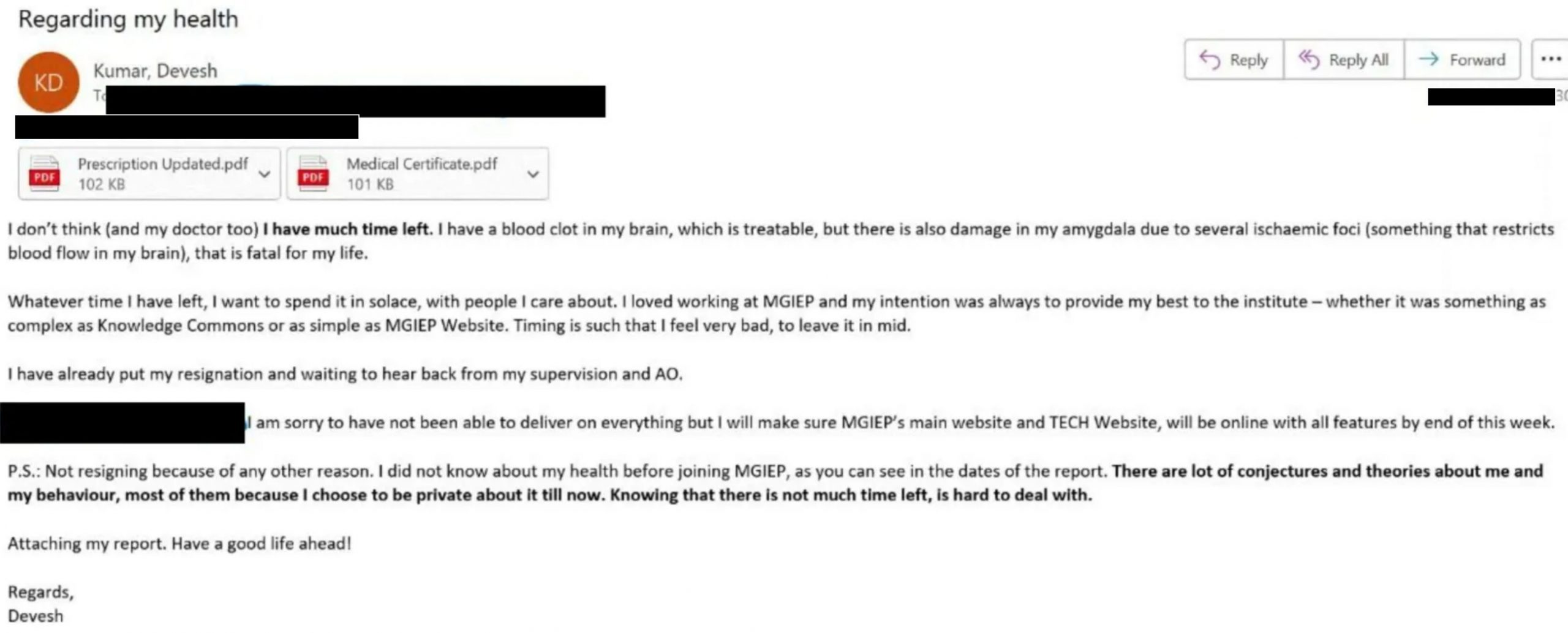
Below are Devesh’s said medical certificates and prescription.
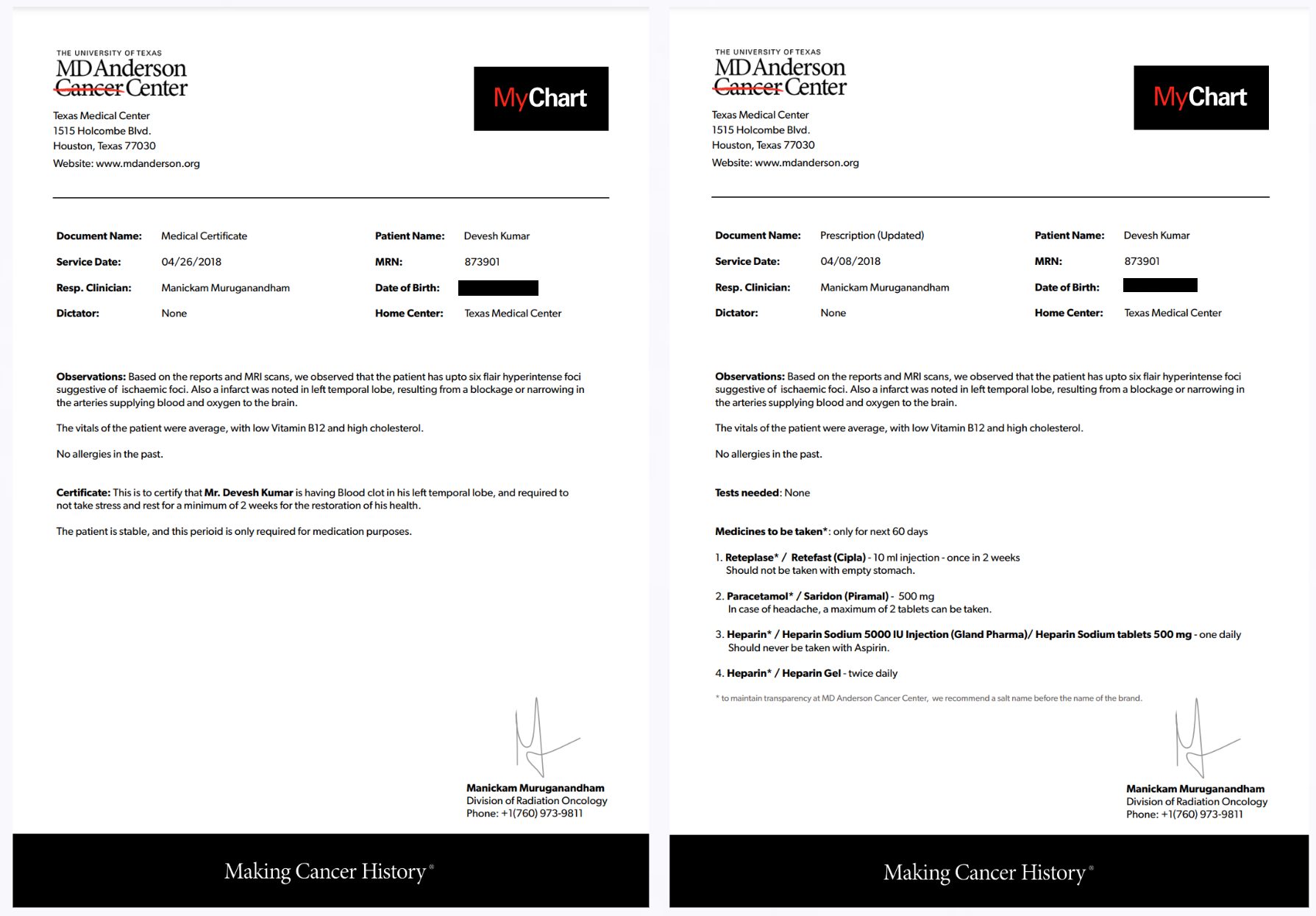
We wrote to the Cancer Centre at the University of Texas, but they couldn’t help with any information owing to strict privacy laws.

We got the prescription and the medical report checked by four medical professionals, one from the US, to check whether the text and the format were the standard way of writing a prescription. The doctors said given the language of the records, there was a high probability that the documents were forged.
One of them, Dr Sujoy Sanyal, a senior neurosurgeon based in Kolkata and fellow at Harvard Medical School, USA, pointed out six glaring anomalies in the documents. He said, “A. The language used in the documents is strange and unlikely to have emanated from a medical facility. B. ‘The vitals of the patient were average’ is definitely not medical lingo. C. Reteplase is a clot busting drug given in emergency circumstances in hospital and never prescribed to be taken once in 2 weeks and has nothing to do with empty stomach. D. Heparin sodium is never supplied as tablets. E. The observation says the gentleman has ischemic stroke whereas the certificate says he has clot in his brain. The observation and the certificate are thereby contradictory F. A radiation physicist who has purportedly issued the certificates has nothing to do with stroke. A radiation physicist can be associated with the treatment of cancers with radiation, but is far removed from the realm of Stroke.”
We tried to reach out to Dr Manickam Muruganandham, the signatory in the documents, who was an assistant professor at the department of radiation physics. This story will be updated if we get a response from him.
Anon3 and Anon4 told us that they were certain this was all a ruse to generate empathy and create the perception that he was brave and not afraid of being vulnerable. It made other people open up about their lives and confide in him. Anon4 said the timing of the brain tumour episode was such that he could use that as an excuse to escape scrutiny for not delivering his projects. On the day of Sushant Singh Rajput’s death in 2020, he sent an email to his colleagues on how he, too, was fighting depression.
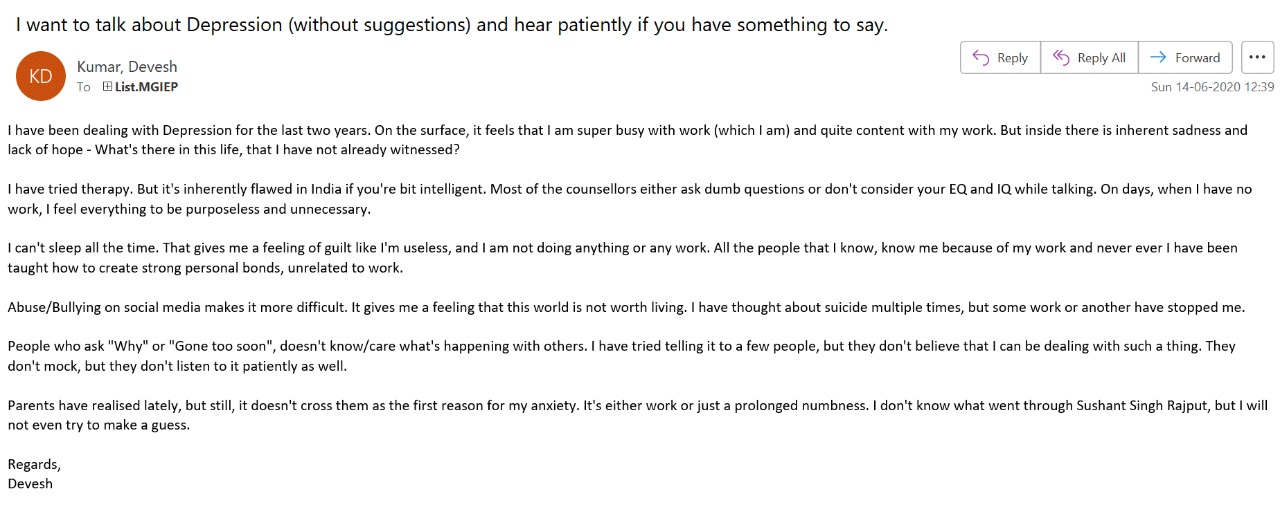
THE ADOPTED DAUGHTER WHO DIED IN A FREAK ACCIDENT
The other personal detail that he shared with his colleagues was that of his adopted daughter, Manjiri. The former MGIEP employees said that at one point everyone was aware Devesh had adopted a daughter named Manjiri. Anon1 said it was a significant part of the image Devesh had created of himself. In fact, Anon1 and Anon2 were so moved by it that both of them were disturbed when one day, Devesh announced Manjiri’s death from a brick falling on her head while she was walking on the streets. Devesh dramatically announced the news to his colleagues in the middle of a meeting and ran out of the office in a fit.
To corroborate this story, we looked further and found a blog published by Devesh Kumar in April 2016. The blog contained letters to his daughter Manjiri, set in the future. Devesh mentions he had met Manjiri’s mother in 2011 while he was working with HIV+ patients. Apparently, he was present during the birth of the infant on one of his social work stints and adopted her after the infant’s mother died at childbirth.
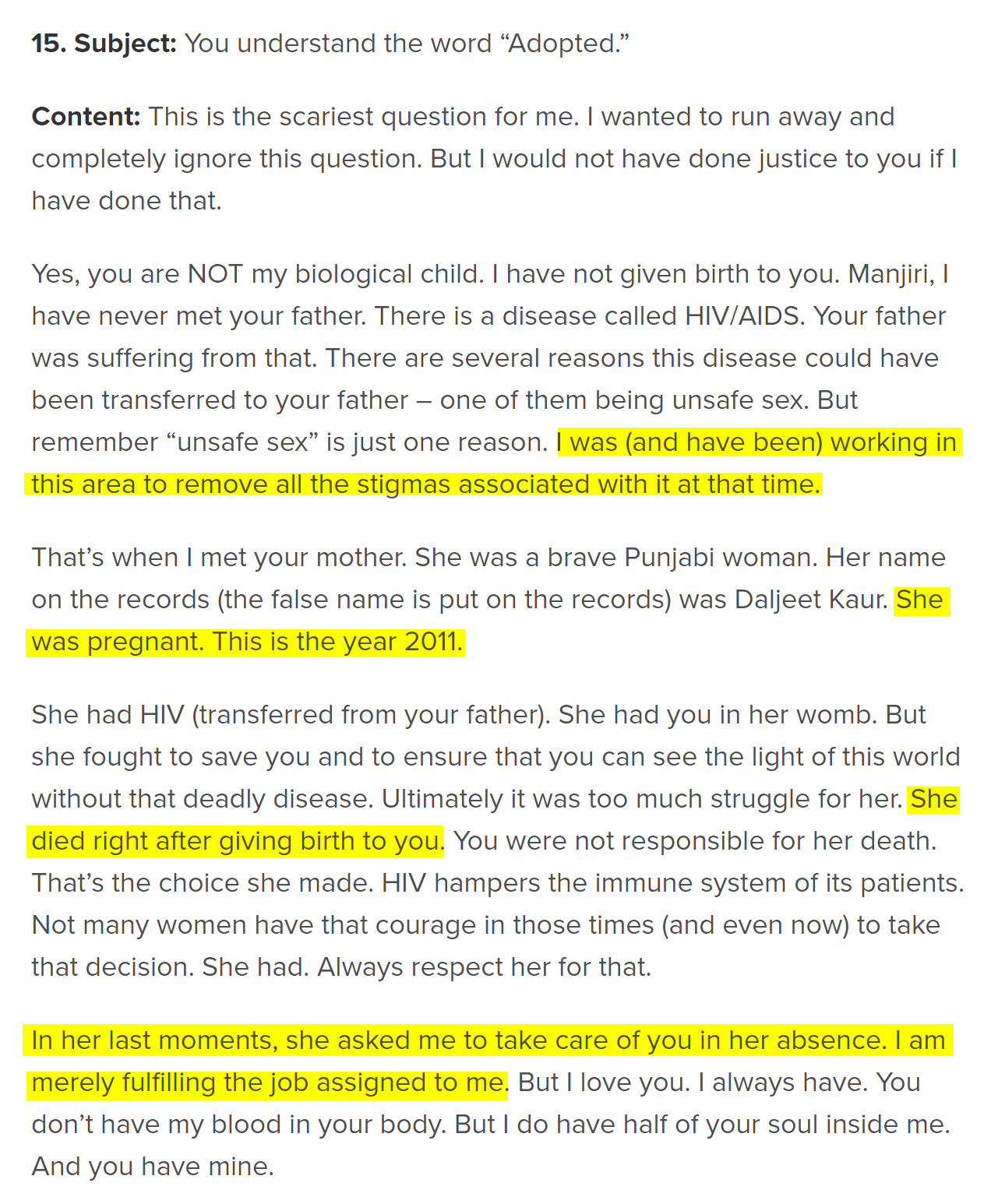
It is relevant to note that as per the adoption law in India, a single man cannot adopt a girl child.
According to Devesh, Manjiri passed away in February 2018 after a construction brick fell on her head while she was on her way home from school. Devesh talks about his grief on his blog ‘onosmosis’. The same incident was narrated in detail by our sources as well. We have learnt that at least one MGIEP employee established immediate communication with the Apollo hospital, Ranchi, which checked records and informed them that no such accidental death of a child had been reported in over six months.
Interestingly, when we looked into Devesh’s Facebook account and dug into this network of friends, we found that a girl named Manjiri did exist in his family. She was an aunt’s daughter. Here is a picture of her from Facebook.
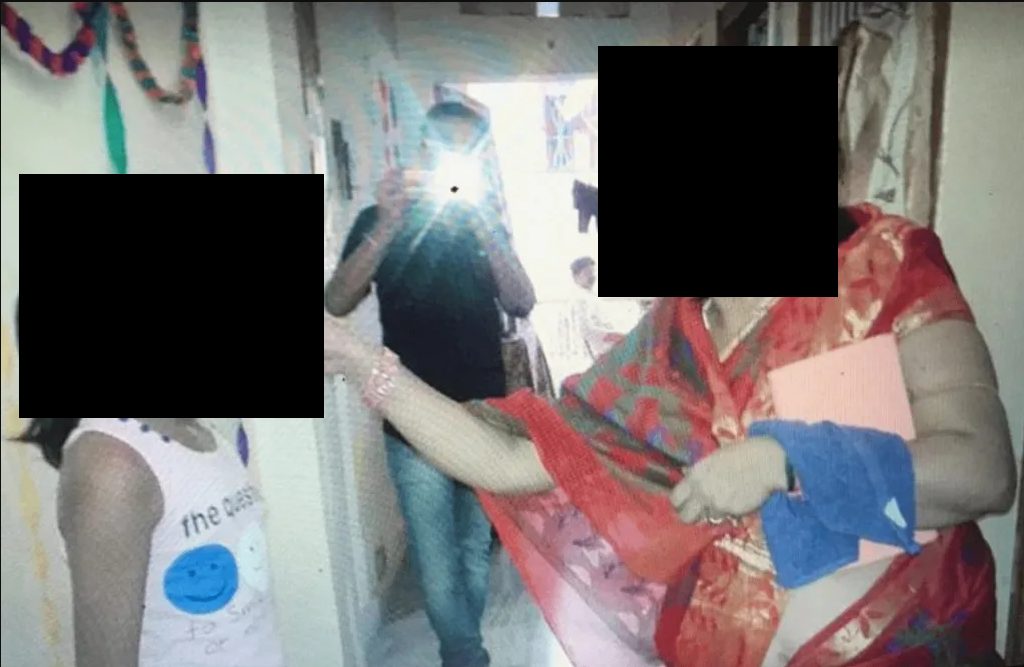
DEATHS IN THE SUMMER OF 2011 SPOILING DEVESH’S PROSPECTS
Manjiri’s death is not the only story of such kind in Devesh’s narrative.
In 2011, answering a question on life on Quora, Devesh talks about a failed initiative, one of many such stories to follow. He says that he started a company with 12 of his friends while in college in 2009. Even before they were in college, they had projects with Microsoft, IBM, Verizon, Aricent etc, and worked remotely. However, in 2011, when they were working on a project that could have supposedlly changed the course of their lives, the person leading the project, Manvi, died of multiple health conditions. Without her, their presentation was unconvincing and hence remained incomplete. Devesh mentions that Manvi passed away sometime between August 6 and August 11 of 2011.
Again, in 2017, while answering another question on Quora, he narrates an eerily similar story of his life — another close friend, who, too, died in the summer of 2011, i.e, around the same time as Manvi. The friend named Rabya was from Hyderabad and she too worked remotely. She knew some of the most complex coding languages, according to Devesh. Rabya had breast cancer and passed away when Devesh was doing his internship in Kolkata.
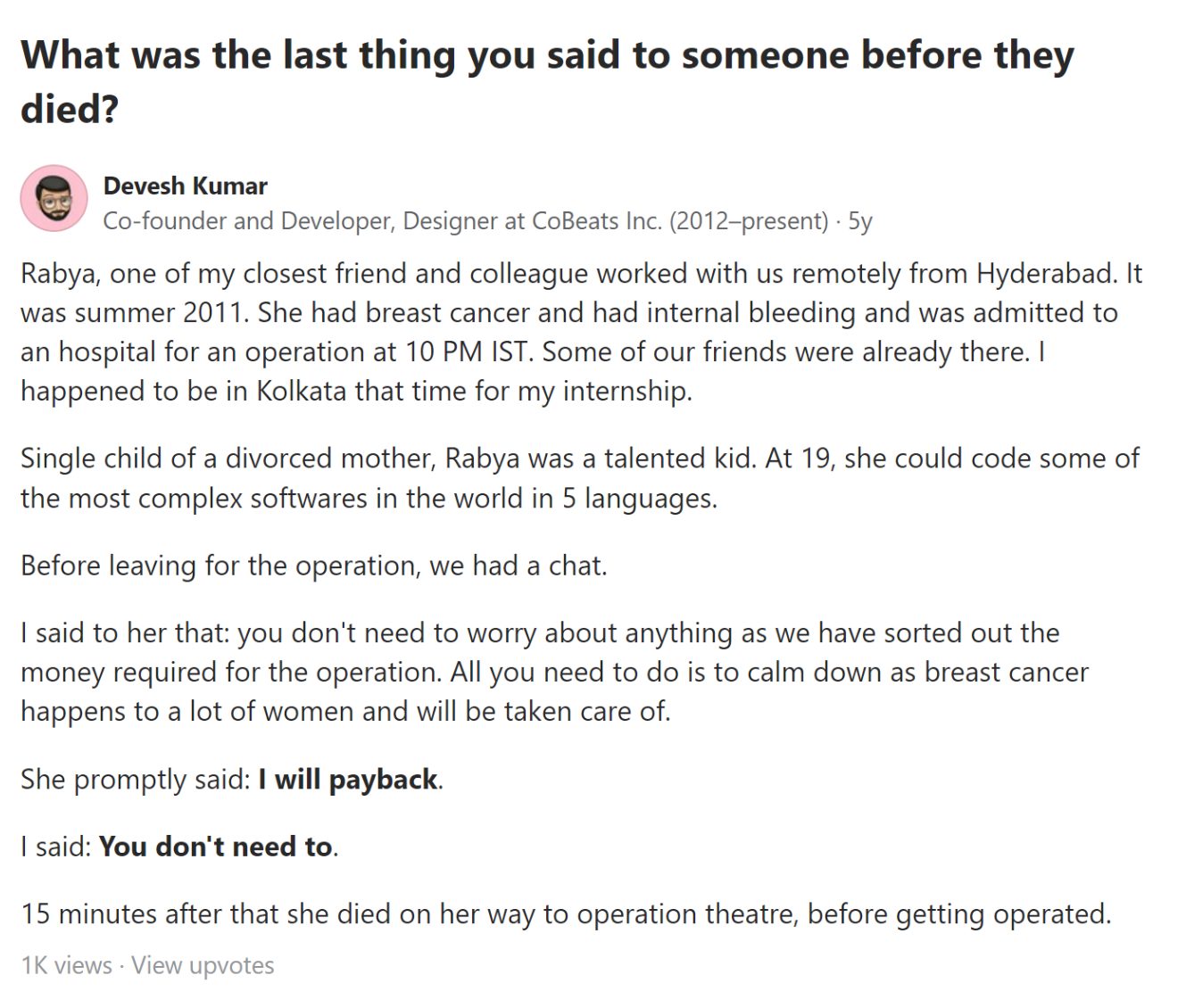
There are also two other people whom Devesh has mentioned in his blogs. In a blog post from 2016 titled, ‘What makes me hopeful’, Devesh talks about a child named Radhika (12) who contracted HIV after she was allegedly raped by a policeman. He met her at the National AIDS Control Organization (NACO) in 2009. She passed away in 2013. In this same blog, Devesh talks about another friend who went from being a victim of substance abuse to a highly accomplished individual. When she gave birth to her first child, she named the child after a colleague of theirs who had passed away.
DEVESH’S RISE THROUGH THE RANKS AT MGIEP
Anon4 said with conviction that collaborations in MGIEP were built on perceptions, and not on actual performances. Devesh had his way at MGIEP because of a certain aura he had created around himself. He was seen as a tech wizard who had turned down offers at Microsoft, Amazon etc., to work in the far less glamorous but socially meaningful education sector.
Anon1 took us through Devesh’s stint at MGIEP to explain this point. Around 2015, when the MGIEP team was looking to develop the Knowledge Commons platform – a one-stop platform for education and sustainability, a project officer (Curriculum Reform) at MGIEP recommended Devesh especially because of his IT background. Devesh lived in Mumbai at that time which happened to be the place where the office of CoBeats Inc. was registered. It was a company Devesh had set up with another person called Vinny Lohan. Devesh was informally inducted into an MGIEP project involving a sample survey on what young people in India thought about education.
Our sources pointed out that the Knowledge Commons platform project had promised much, but it yielded very little. At present, the UNESCO MGIEP website has a knowledge commons page with a link for contributions. The link opens the following page. The readers must note that this was a functional website when we looked it up during our investigation. On December 24, 2022, we wrote to the UNESCO Ethics Committee asking it about its nature of association with Devesh Kumar. After that, we found that the website was no longer accessible.
Knowledge Commons platform also has an alternative domain (https://kcommons.org/). Here’s the archive link.

In 2016, Devesh announced he had developed an app for Dyslexia. He proposed to organize a conference in India on Dyslexia, titled the Unlearn programme. It was conducted on a large scale in IIT Delhi and was attended by school teachers from Delhi and several international resources. One of them was Nandini Chatterjee Singh, a cognitive neuroscientist. She had established the first cognitive and neuro-imaging laboratory in India at the National Brain Research Centre. Eventually, she was hired as a senior project officer at the MGIEP in 2017. The success of the conference and Devesh’s association with Nandini raised his stature at the organization.
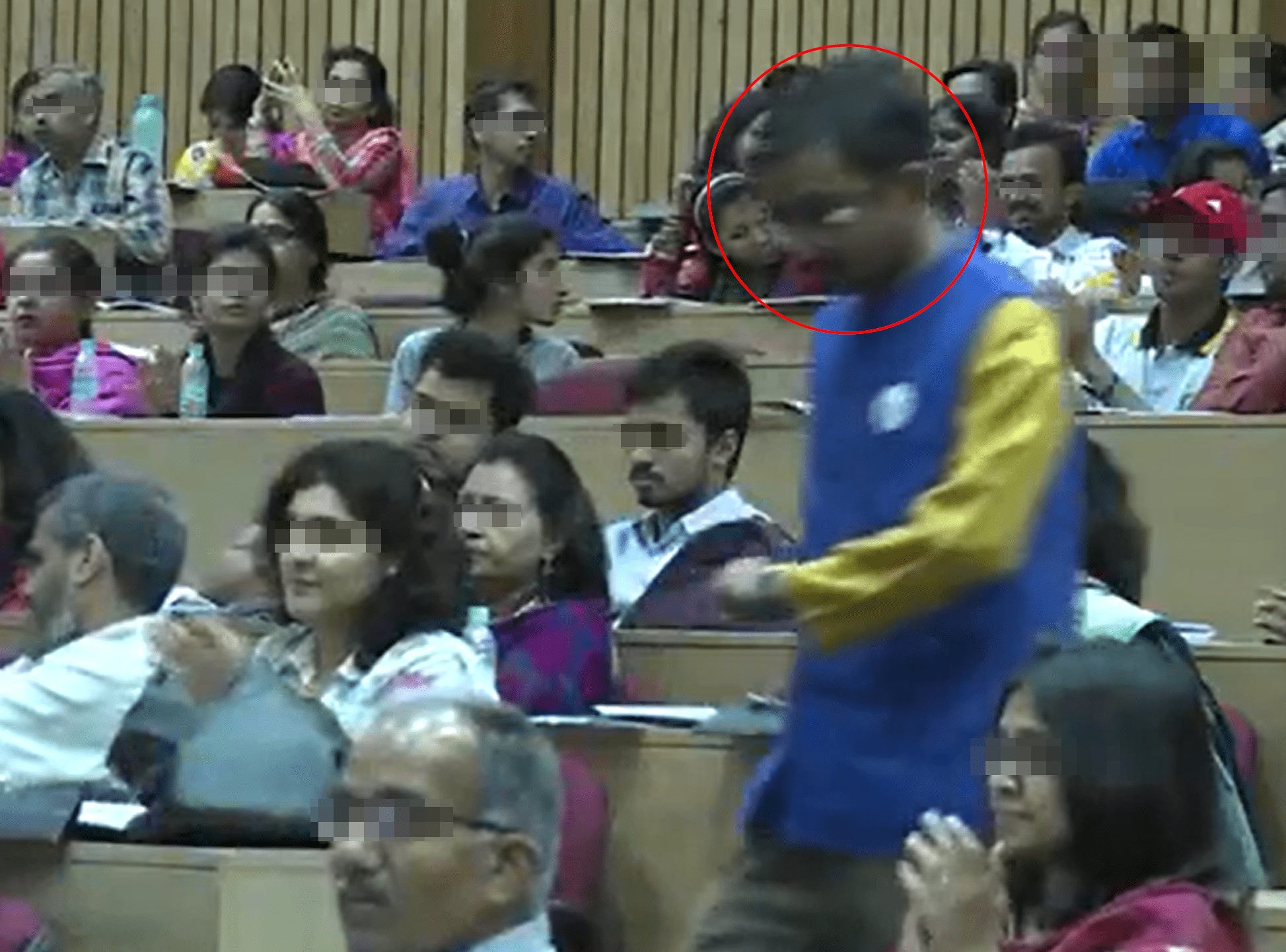
All of our sources mentioned that Devesh had an unusual sway over the MGIEP management. He was privy to their personal and professional lives long before he was formally inducted. Whether it was organizing company retreats or giving inputs on projects, his role was much more important than what is natural for a volunteer working as a youth representative.
By 2015, he had already established himself in the organisation in a way that he could get the MGIEP to promote/endorse his individual initiatives. For example, he organised the programme called REVA, which he claimed was the ‘largest event for underprivileged kids, with more than three cities in India hosting the event every year’. This event was formally endorsed by UNESCO MGIEP.
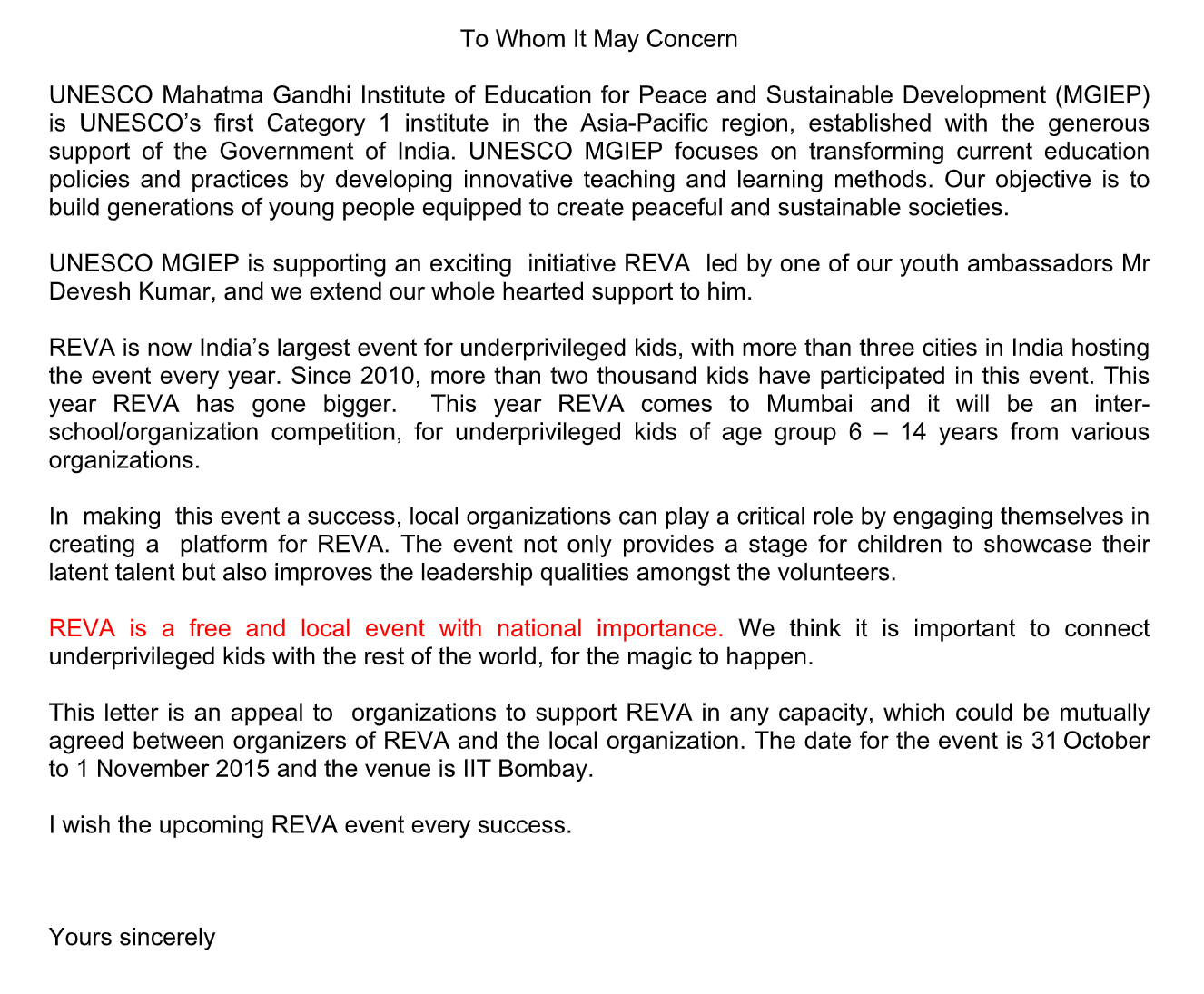
In fact, he sought crowdfunding for several initiatives, like the involvED conference and Reva fest. Both of these conferences were organised by WhiteShark, another organization that Devesh founded with Vinny Lohan. In 2018, Priyanka Patel, an MGIEP intern, tweeted that Devesh had launched the world’s largest competition to change the state of mental health in India. This competition called ‘Okdepression’ was looking for scaleable solutions to mental health issues, and the winners would be awarded $50,000 for implementation.
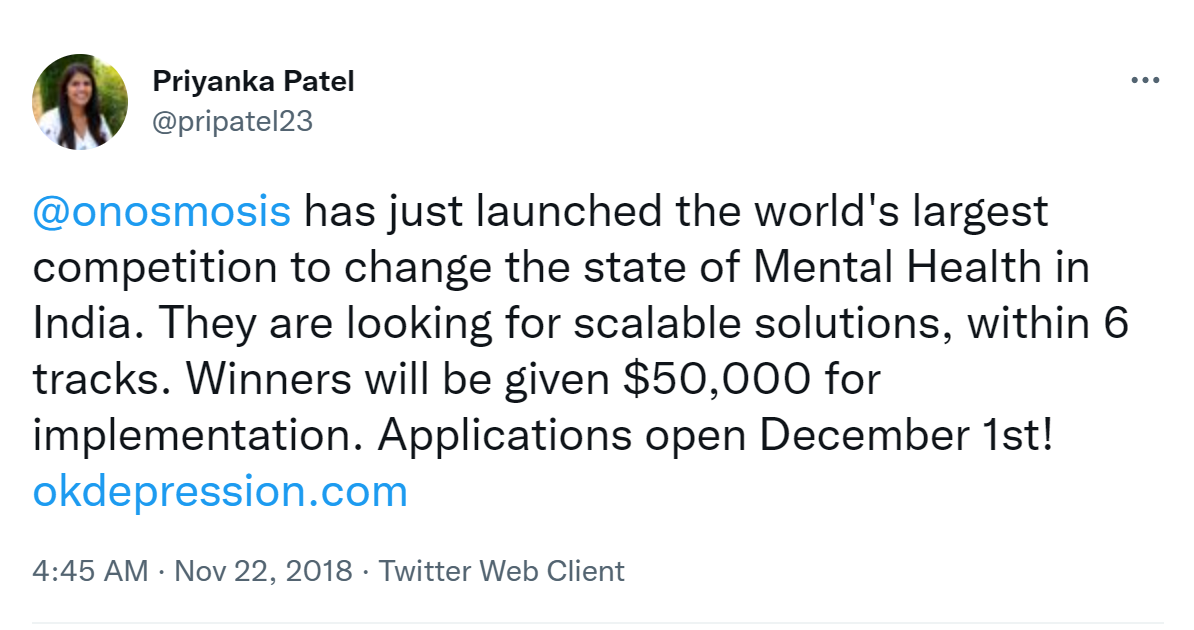
Alt News did reach out to Priyanka Patel via email and other means but our messages remain unanswered.
Additional questions about his finances also come from the fact that during the peak of the Covid-induced lockdown, Devesh was working on the TekFog investigation. His monthly bills according to him ran up to 45,000-55,000 INR.

Even if we consider the fact pointed out by Anon2 that roughly between 2018 and 2020, Devesh drew a salary as per international standards at the MGIEP, contrary to the regular practice of consultants being paid as per Indian market rates, the above admission about his expenses seems exceptionally high.
In 2020, Devesh produced an offer letter from Thomson Reuters – New York. According to this, he was offered a yearly gross salary of 192,000 USD or around 13 lakhs per month. Our sources independently told us that Devesh had used this offer letter to bargain for a raise during the renewal of his contract with MGIEP. The sources emphasised that the basis of the raise was due to Devesh being an ‘exceptional talent’.
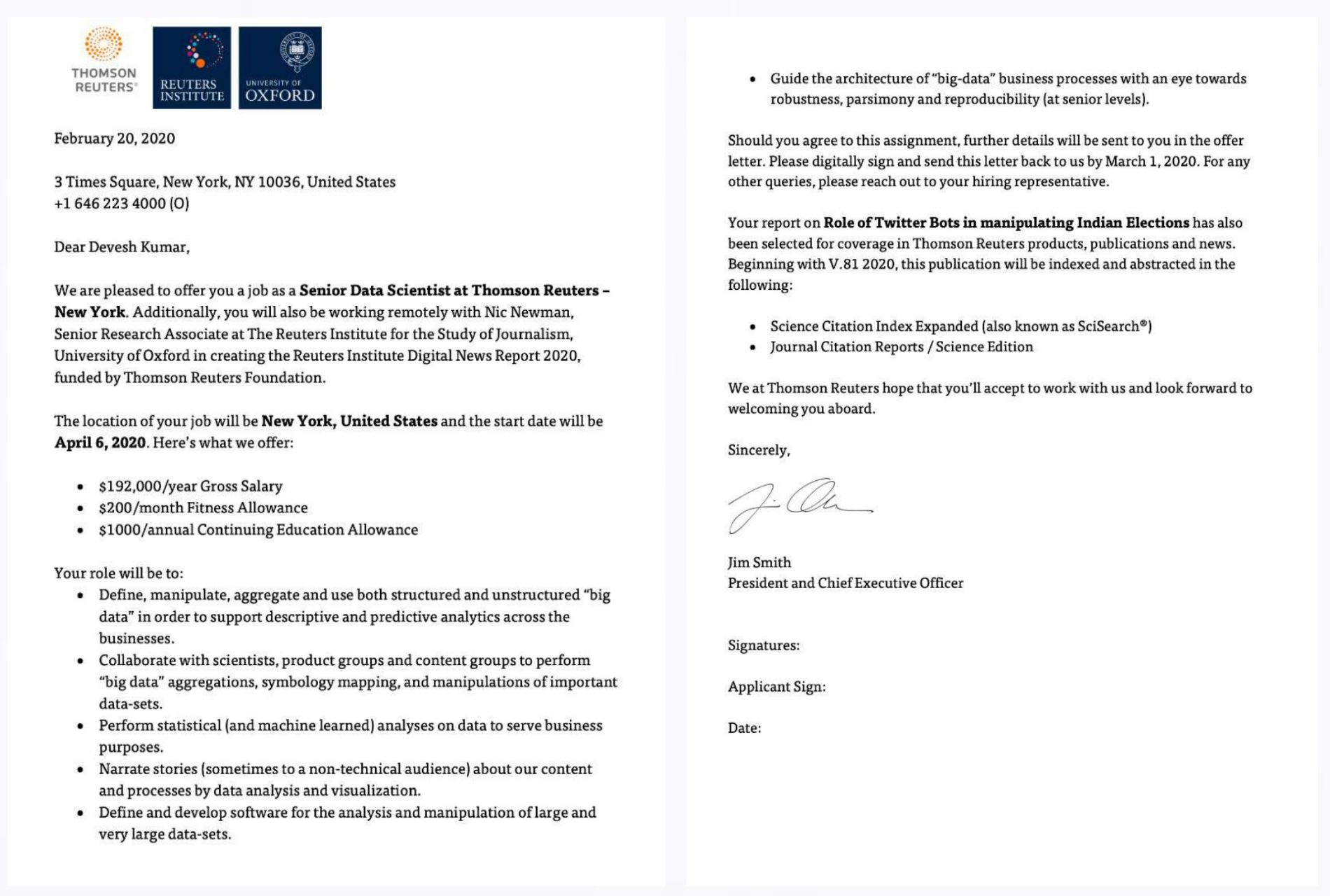
Contradicting his own claims within MGIEP, Devesh had publicly claimed in a Newslaundry interview post-Tek Fog revelations that he remotely worked with Reuters for seven months in 2020. We wrote to Reuters separately to cross-check and they replied to us saying they had no record of such an individual working for them.

Anon3 mentioned that MGIEP was due to receive a significant amount in grant from FICCI and Vodafone Foundation for a project managed by Nandini and Devesh, of which there was no accountability.
We have attached below a copy of an email from FICCI to Devesh and his conversations with his colleagues thereafter. If one reads the mails carefully, one can catch Devesh making exaggerated and grand declarations, as is his wont. In the mail text, the Millennium Alliance team explicitly mentions that qualifying for due diligence in the Round – 4 is no way a promise of the award. Devesh, however, jumps into declaring that they were ‘going to get the money’. In the same mail trail, the director writes back to Devesh, “No idea what this means but I guess part of the process!”.
While speaking to us, each of our sources appeared extremely anxious. They claimed that patronage from the MGIEP brass gave Devesh access to and control of the technical operations at the institute. There were also very odd instances when emails would suddenly disappear from inboxes, and alerts would be issued about servers getting hacked, which Devesh alone could resolve. Interestingly, similar incidents of hacking were reported by The Wire during the Meta fiasco as soon as Devesh came under the scanner.
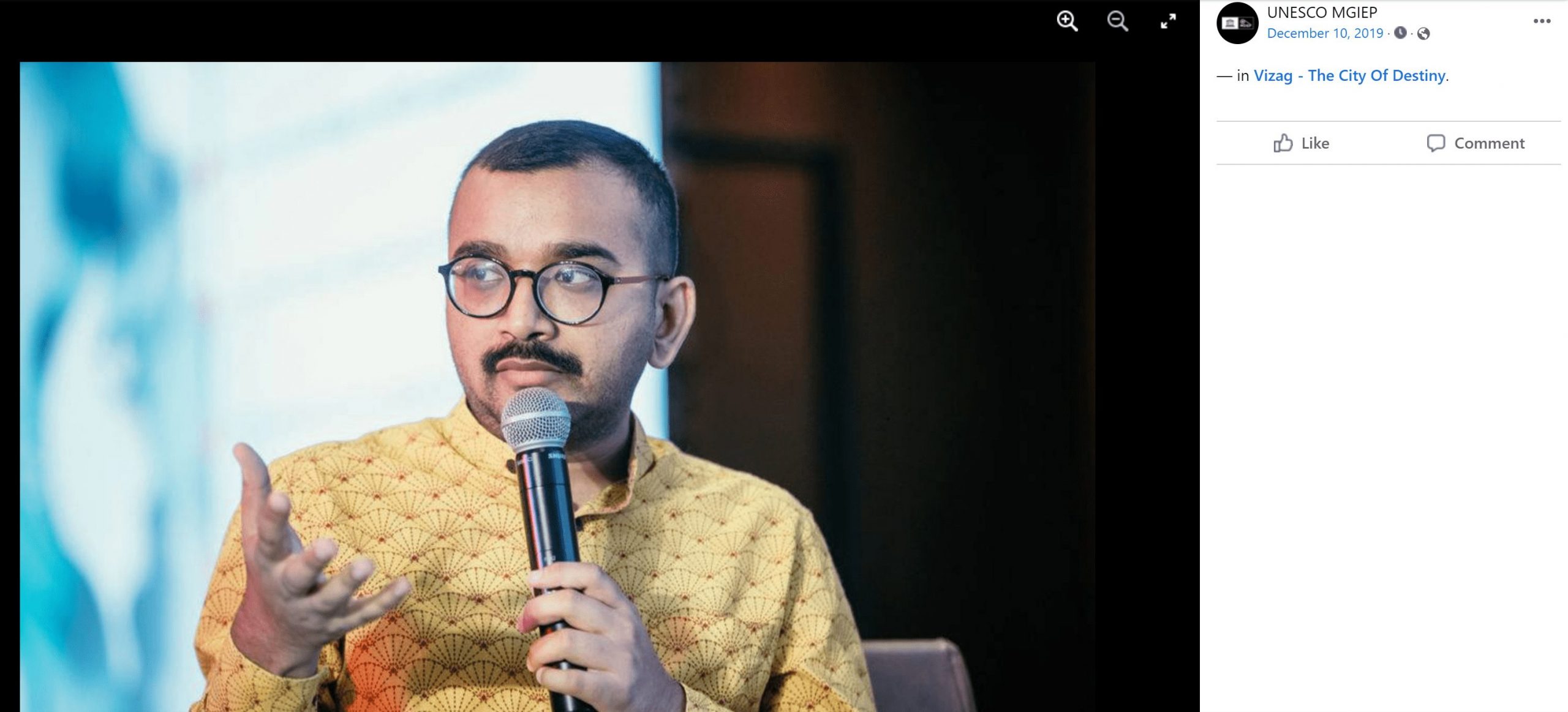
QUESTIONS GALORE
It is difficult to understand how Devesh Kumar managed to work on projects for huge companies, volunteer at social organisations, and intern in a different city while being a student at BITS Mesra in 2011 — all at the same time. In fact, Devesh’s professional career is filled with such unresolved questions. We have outlined some of them here.
Devesh’s bio on Quora, and in his blogs on Medium, mention him as a co-founder of WhiteShark and Cobeats Inc. There were testimonials from three people on the landing page of the CoBeats website.
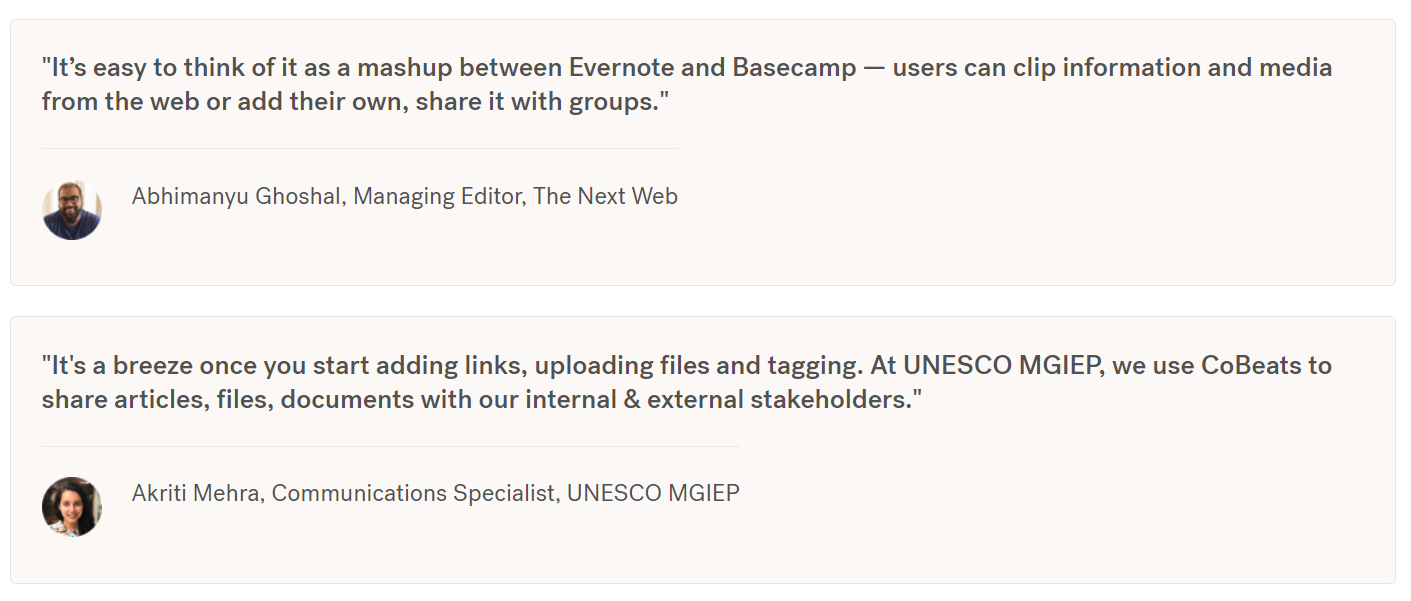
When we reached out to Abhimanyu Ghoshal, he told us that he had written about a product called ‘Gluepad’ in 2013 while covering Microsoft’s startup accelerator in Bangalore, where WhiteShark was one of the participants. He clarified that he did not give a testimonial, and his journalistic work was used as one without his consent. He was also not aware that the product had been renamed to ‘CoBeats’. These testimonials were removed from the landing page overnight after we wrote to the MGIEP asking questions about Devesh. However, they remained available on a different page on the website.
It is interesting to note that Devesh and his long-time professional partner Vinny Lohan have very similar public narratives about personal tragedies converted to business ideas. Incidentally, Vinny Lohan had won the national finals of the Microsoft Imagine Cup in 2010 and Devesh Kumar later won it in 2012. In fact, Vinny had mentored Devesh’s D Labs team during the event in 2012.

The products and services of CoBeats Inc, one of the companies they had jointly set up, were contractually implemented within MGIEP. Our sources talked about seeing Vinny Lohan visiting the MGIEP office for work. Both Devesh and Vinny were keenly in favour of open-sourcing their projects. They also regularly participated in locally organised TEDx talks. Devesh and Vinny’s company also built a tool for MGIEP called ‘Knowledge Commons’ in just 21 days.
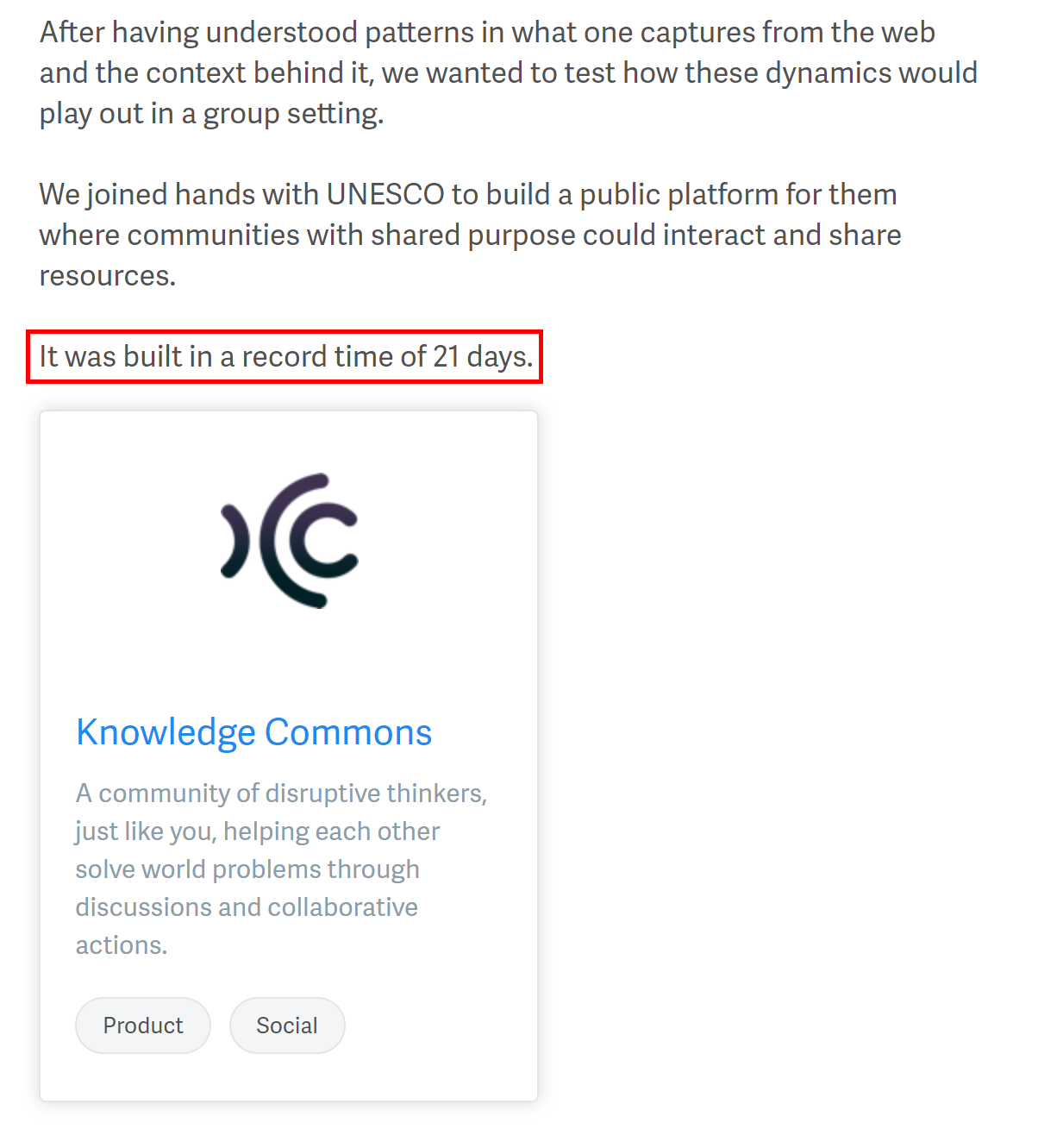
This faith in ‘open source’ also came up during the Tek Fog investigation. Devesh and his co-author Ayushman Kaul told Newslaundry in the interview that they would ‘open-source’ all their findings while redacting information that might compromise their source. After the publication of their story, multiple people did reach out to Devesh and Kaul. Devesh took a U-turn and informed an individual that he was no longer associated with the Tek Fog story and that a consortium of media houses involved would publish future investigations. Kaul named Forbidden Stories, Washington Post and The Guardian. And by connection, The Wire as well, because the stories were published by them.
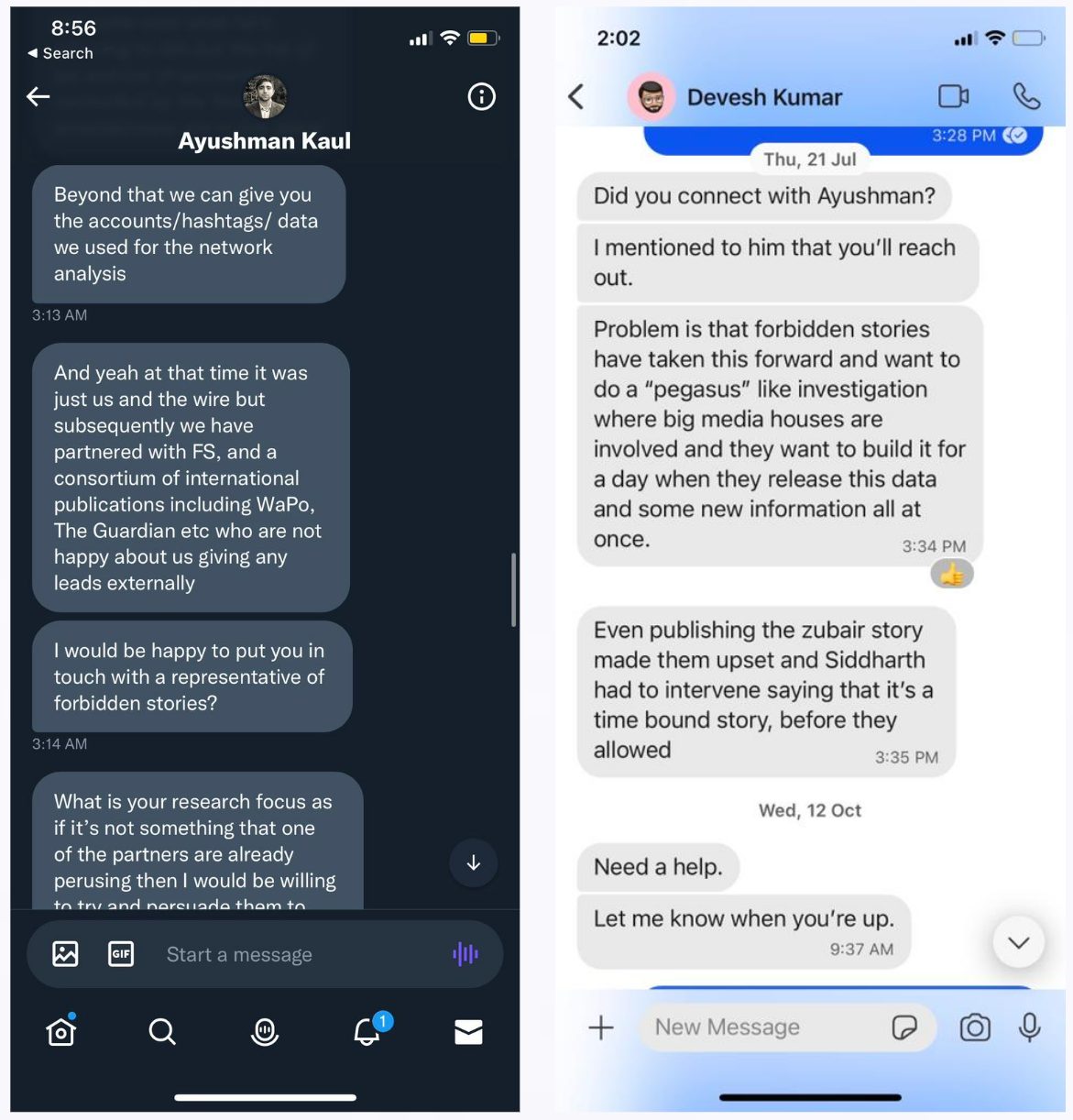
Alt News reached out to Forbidden Stories and The Washington Post. Both organisations denied having access to Tek Fog. Forbidden Stories said it ‘never had access to Tek Fog data and is not working on that story’. The Post said it was not in any collaboration with The Wire other than the Pegasus Project.
Devesh’s Reddit and Quora blog posts mention his work with NACO, making documentaries for the Gates Foundation on sex workers, thus establishing his credentials as a socially conscious individual. We wrote to the Melinda Gates Foundation to verify the authenticity of the mail from Bill Gates. We are yet to receive any response.
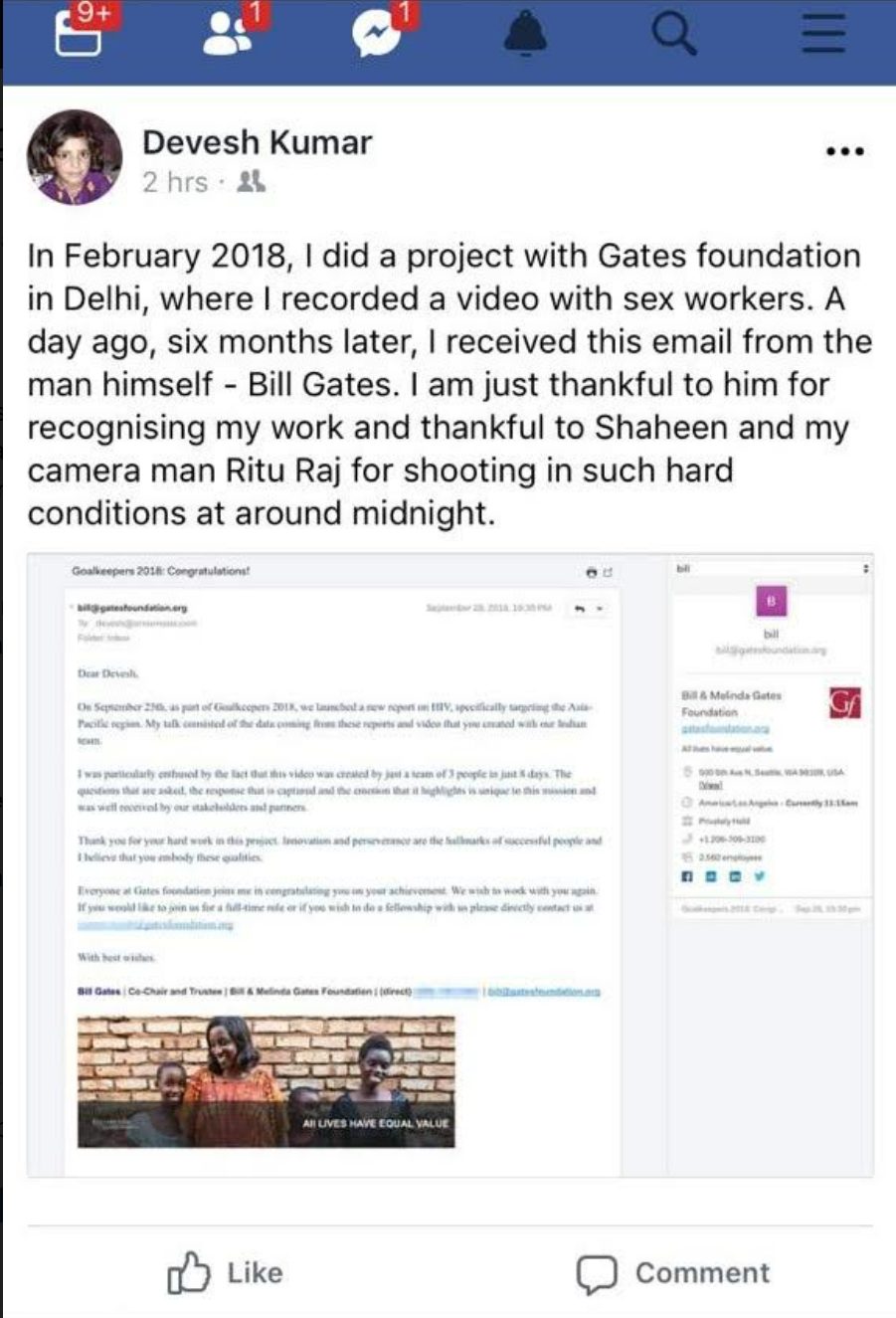 In one of his blogs, Devesh claimed to be a regional director at Microsoft. However, the FAQ page about regional directors suggests that Devesh does not meet the prerequisites.
In one of his blogs, Devesh claimed to be a regional director at Microsoft. However, the FAQ page about regional directors suggests that Devesh does not meet the prerequisites.
Other than sources at MGIEP, we also reached out to Deepali Sinha, described by Devesh as his sister in a VSCO post, but she did not respond.
TEK FOG AND META: THE CLIMAX OF THE DEVESH KUMAR SAGA
A profile of Devesh Kumar will be incomplete without addressing the two projects that brought him under the spotlight.
Tek Fog is reportedly a mobile software application used by the BJP to manipulate/hijack social media trends, spread misinformation, implement targeted harassment, create or delete social media accounts and even take control of dormant WhatsApp accounts.
When the three-part Tek Fog series by Devesh Kumar and Ayushman Kaul came out in January 2022 on The Wire, tech journalist Samarth Bansal critically analysed the claims. To him, it seemed “there was simply not enough evidence in this reporting to prove its far-reaching claims”.
One of the features of the Tek Fog app highlighted by The Wire reports was that one could create or delete social media accounts with a single click. Bansal points out that other than screenshots of the app suggesting such an feature existed, The Wire could not independently verify the existence of such an exploit. Devesh Kumar gave a justification to Bansal that simply did not make any sense.
“We added this without verification for the sake of completeness. One of the features we have verified was how a large number of accounts were tweeting to trend hashtags. If we did not add the part where the Tek Fog app can create or manage multiple accounts, then a lot of people would have questioned how they are doing this? How are thousands of accounts coming on a single app?” said Devesh.
The Tek Fog stories were eventually withdrawn by The Wire on October 23, 2022.
On October 10, 2022, The Wire released the first of its Meta investigation stories headlined, ‘Exclusive: If BJP’s Amit Malviya Reports Your Post, Instagram Will Take it Down – No Questions Asked’. This article was formally retracted on 23rd October. To briefly explain, the story claimed that the BJP IT department chief Amit Malviya had privileges that are usually accorded to high-profile users of Instagram via the XCheck program. This program, initially reported by the Wall Street Journal in 2021, shields millions of VIP users from the company’s normal enforcement process. The Wire story said, unlike the widely known aspect of the program, Malviya had a special privilege by dint of which he could take down any post which was critical of the ruling government on the pretext of showing nudity even when there was none. To justify their claims, The Wire then went on to publish a series of stories which had as evidence
- A screenshot of Instagram’s review process
- A video showing Instagram’s internal workspace, which Meta dismissed saying such an URL (instagram.workspace.com) did not exist
- Screenshot of an email from a disgruntled Andy Stone, the policy communications director at Meta, unhappy with leaks of internal documents. Meta dismissed this as fabricated
- DKIM verification of the email done by experts. Those experts repudiated The Wire’s claim publicly.
Meta spokesperson Andy Stone’s response to the alleged take-down of the original Instagram post was that it was due to automatic flagging.
A number of people, including journalists and cyber security experts, raised questions on the authenticity of the sources and material evidence provided by The Wire to prove Malviya was complicit in the misuse of the XCheck programme. Across four stories on Meta, The Wire went from aggression to defence to apology.
Interestingly, according to the complaint filed by The Wire, it is Devesh who approached the outlet with materials related to the XCheck program and Amit Malviya after a story was published on October 6 which simply said that Instagram had taken down a post by the user @cringearchivist for violating community guidelines around nudity. The Wire started its investigation at that point.
The first story came out on October 10 with the byline of Jahnavi Sen. The second story dropped on October 11 with the byline of Sen and Siddharth Varadarajan. As per Newslaundry’s reportage, Kumar did not opt for a byline claiming that naming him would compromise his sources or whistle-blowers. However, he defended the story publicly on Twitter and to critics giving them the impression that he had personal stakes in the story. The third story of the series on October 15 had Devesh’s byline. It was a ‘point-by-point response’ to everything Meta had used to refute the earlier stories.
The October 15 report titled ‘Meta Said Damaging Internal Email is ‘Fake’, URL ‘Not in Use’, Here’s Evidence They’re Wrong’, featured a DKIM signature verification. One of the experts who allegedly endorsed the findings had replied to Devesh, but the date was set to 2021. When confronted with this, the initial explanation provided was that this was due to incorrect default time with tailsOS. Then a subsequent explanation was provided which contradicted the first explanation. It said, the computer was formatted using tailsOS and one of the authors while setting up the computer had manually entered the wrong dates.
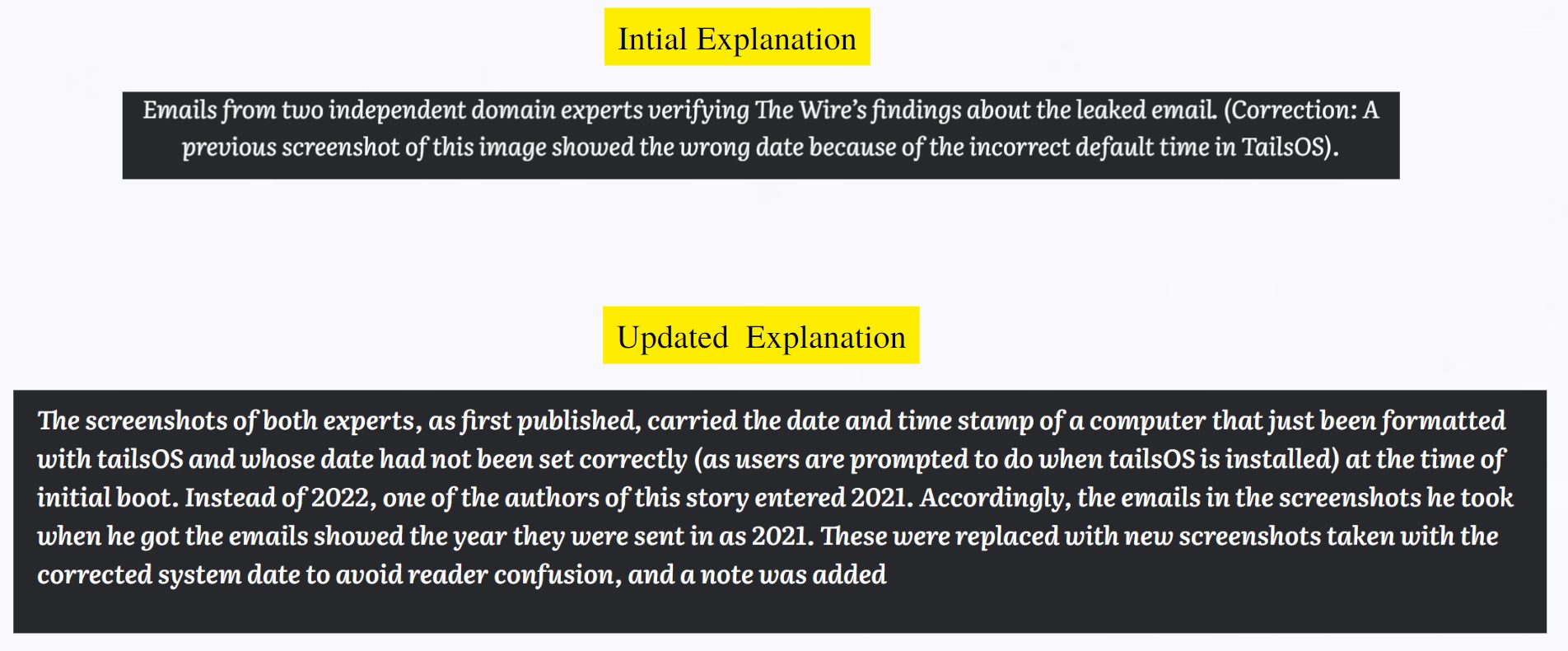
As pressure mounted, on October 16, Siddharth Vardarajan announced that a protonmail address of The Wire was hacked. It was also said that Devesh Kumar had lost access to his Gmail and Twitter and later regained access to the accounts. It was unclear how Devesh lost access to all of his accounts including his 1password in this age of two-factor authentication. Devesh, as is his wont, came up with a bizarre explanation. He said he had deactivated his accounts to have ‘chaat’ (snacks).
Similar tales of hacking were narrated by Devesh in a Twitter thread couple of months after Tek Fog investigations. He said he had to format his computer sometimes 2-3 times a day. This is also parallel to what was happening at MGIEP — when pressure mounted on Devesh, the organisation suddenly gets hacked and only Devesh can come to the rescue.
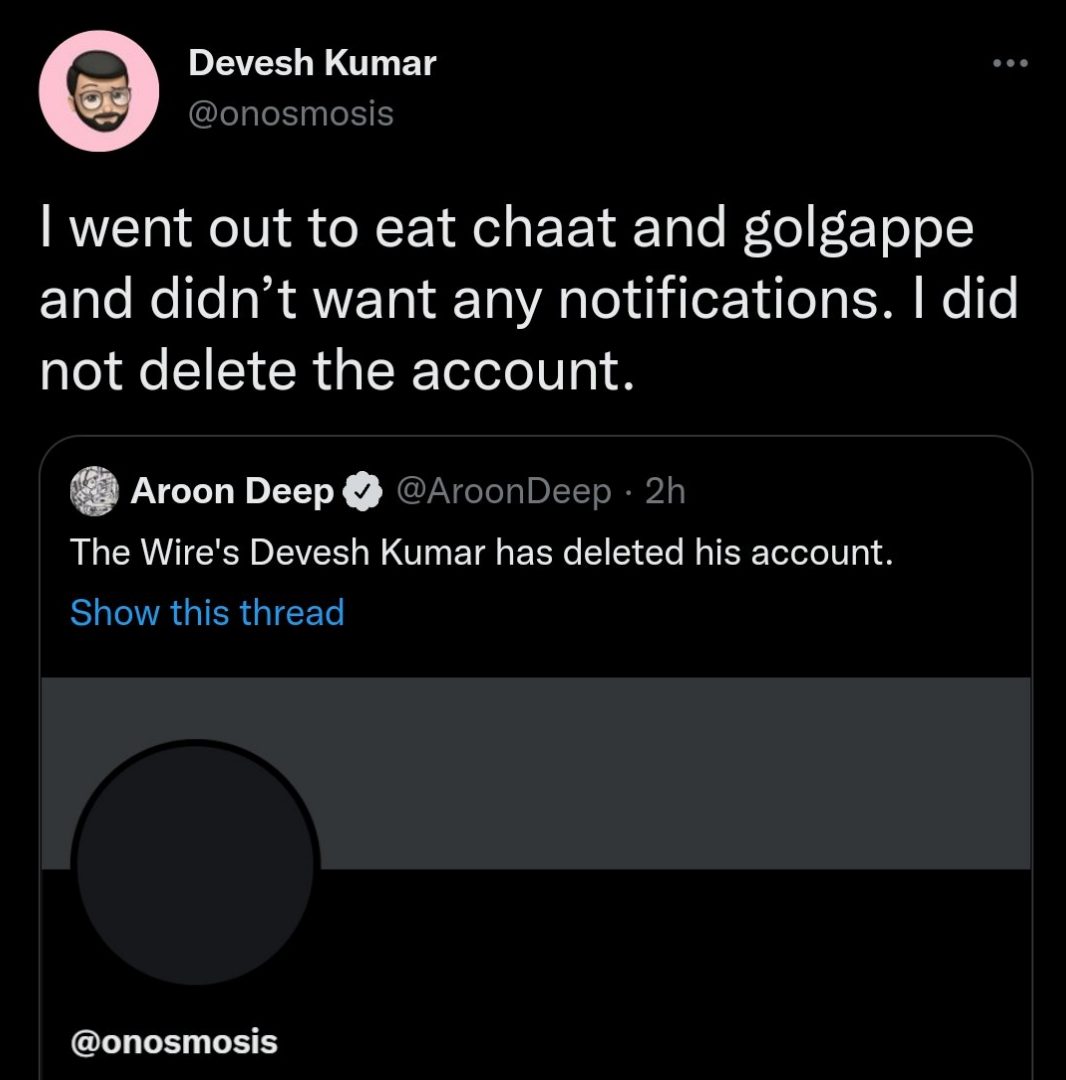
Matters took an even worse turn for The Wire when two independent experts who were said to have endorsed the findings of the Meta investigation publicly refuted the claims on October 18 and 21.
When former data scientist turned whistle-blower Sophie Zhang also raised doubts regarding The Wire’s Meta XCheck story, Devesh told her that her knowledge of the XCheck system was either incorrect or outdated and he had a far better understanding of it. Zhang herself narrated this to The Caravan.
She admits that Devesh’s conviction made her step back and assume he was correct as it had been more than a year since she had left Meta. She told The Caravan that she had never seen Meta deny an actual document. “In the past, when I first came forward with my revelations regarding Meta’s unwillingness to counter inauthentic networks being used to influence political outcomes in several countries, they did accuse me of lying, but retracted that as soon as we presented documents to the contrary. They did not accuse those documents of being fake,” said Sophie. Devesh also told Sophie that Meta had not said that the documents presented by The Wire in support of their claims were fake. However, Meta did come out and say on October 12 that the documents were fabricated.
It seems while ‘coming up’ with the Meta stories and selling it to the public, Devesh Kumar relied on the perception of Meta as an organisation with questionable moderation ethics and the BJP government’s predilection for citizen surveillance.
There is no doubt that there were a lot of editorial lapses on the part of The Wire while dealing with the Meta stories, but when one looks at the publicly available details of Devesh Kumar’s professional history, one gets to see a pattern — one in which exaggerations, manipulations, making dubious claims and putting out fabricated narratives are recurrent motifs.
(With inputs from Archit Mehta)
A statement by Abhimanyu Ghoshal was updated on 27-01-2023.
Independent journalism that speaks truth to power and is free of corporate and political control is possible only when people start contributing towards the same. Please consider donating towards this endeavour to fight fake news and misinformation.

